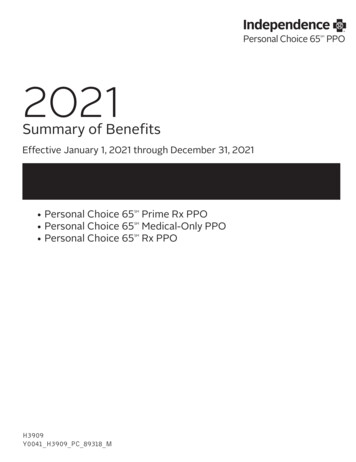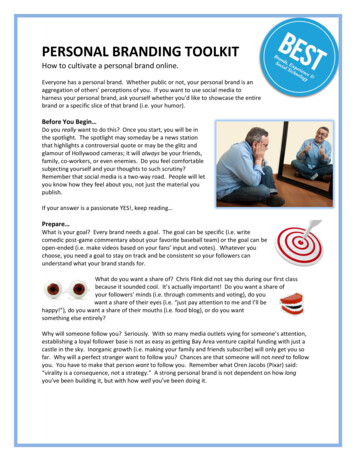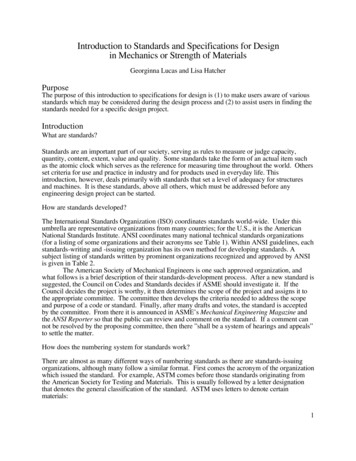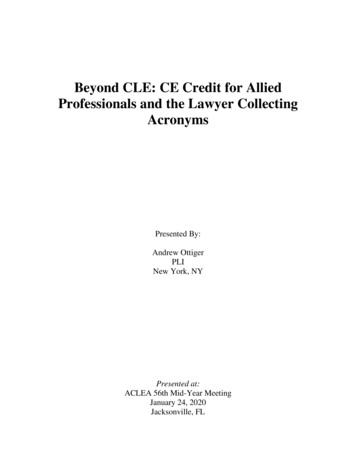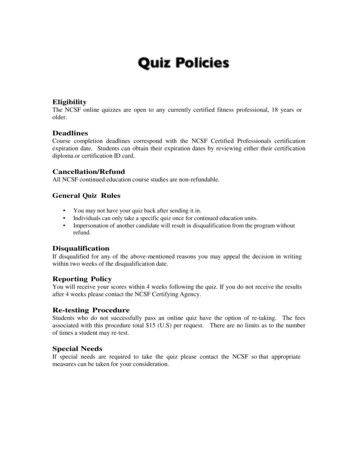
Transcription
EligibilityThe NCSF online quizzes are open to any currently certified fitness professional, 18 years orolder.DeadlinesCourse completion deadlines correspond with the NCSF Certified Professionals certificationexpiration date. Students can obtain their expiration dates by reviewing either their certificationdiploma or certification ID card.Cancellation/RefundAll NCSF continued education course studies are non-refundable.General Quiz Rules You may not have your quiz back after sending it in.Individuals can only take a specific quiz once for continued education units.Impersonation of another candidate will result in disqualification from the program withoutrefund.DisqualificationIf disqualified for any of the above-mentioned reasons you may appeal the decision in writingwithin two weeks of the disqualification date.Reporting PolicyYou will receive your scores within 4 weeks following the quiz. If you do not receive the resultsafter 4 weeks please contact the NCSF Certifying Agency.Re-testing ProcedureStudents who do not successfully pass an online quiz have the option of re-taking. The feesassociated with this procedure total 15 (U.S) per request. There are no limits as to the numberof times a student may re-test.Special NeedsIf special needs are required to take the quiz please contact the NCSF so that appropriatemeasures can be taken for your consideration.
What Do I Mail Back to the NCSF?Students are required to submit the quiz answer form.What do I Need to Score on the Quiz?In order to gain the .5 NCSF continued education units students need to score 80% (8 out of 10)or greater on the CEU quiz.Where Do I Mail My Quiz Answer Form?You will mail your completed answer form to:NCSFAttn: Dept. of Continuing Education5915 Ponce de Leon Blvd., Suite 60Coral Gables, FL 33146How Many CEUs Will I Gain?Professionals who successfully complete the any continuing education quiz will gain .5 NCSFCEUs per quiz.How Much does each quiz cost?Each quiz costs the student 15.00.What Will I Receive When The Course Is Completed?Students who successfully pass any of the NCSF online quizzes will receive their exam scores,and a confirmation letter.How Many Times Can I Take The Quizzes For CEUs?Individuals can take each NCSF quiz once for continuing education credits.
Professional Standards and the Personal Trainer1Professional Standards and the Personal TrainerPeople make decisions every day. Someare relatively simple and affect only theindividual: bagel or eggs for breakfast? Jeansand t-shirt or khaki pants and collared shirt?Other decisions require an individual to processmultiple aspects of a situation involving othersand make a decision based both in logic andemotion. In cases such as these, individuals mustfollow established guidelines, along with theirown personal code of ethics, to help them makethe soundest decision possible. Personal trainers,along with other health practitioners, findthemselves making such decisions every day. Itis important to keep in mind that healthpractitioners are held to a higher standard thanthe average vocation because of the unevenrelationship between the professional and thepatient, so trainers must be especially careful tofollow ethical guidelines and maintain thehighest professional standards possible.Professional standards are necessary forpersonal trainers because they distill theexpectations of what comprise sound andappropriate practices. Professional standardsidentify ethical considerations and addressdefinitive actions associated with professionalconduct. They also can serve as the foundationfor judging the merit of a formal grievance orallegation relating to violations of professionalor ethical principles within a vocation. Inessence, defined professional standards providean individual with guidance for appropriatebehaviors, activities, and the decision-makingprocess within the scope of their practice. Anindividual can examine defined standards ofpractice and easily implement a professionalself-evaluation; these particular components ofprofessional development are constructivelydeveloped by peers to enhance the integrity andrespect of the profession.Health professionals such as personaltrainers are required to make decisionspertaining to all aspects of their responsibilitieson a daily basis. These decisions could relate toany number of situations: for example, trainersmustalwaysproperly representtheircertifications and expertise and keep theircertifications current. This last point isextremely important; legitimate certificationswill require a trainer to get recertified everycertain number of years (as dictated by thecredentialing body). The fitness industry is anever-changing environment, and trainers shouldstay up-to-date on current research. Trainersmust also maintain an appropriate relationshipwith their clients. Not only does personaltraining involve a lot of one-on-one time, it canalso require physical contact in an environmentthat lends itself to casual conversation and dress.Trainers must set boundaries with their clients toavoid any appearance of impropriety. Severalhigh-profile trainers have been caught behavinginappropriately with their clients, and realityshows have aired the fallout of trainer-clientrelationships gone awry. Such antics giveprofessional trainers the proverbial black eye,and potential clients wonder if all trainersbehave the same way.Professional standards also provideguidance for trainers who must stay within thescope of practice for personal trainers; displayduty of care during emergency or safetyprocedures; maintain proper documentation; andproperly manage participant, environmental, andprofessional risks. The ability to make the rightdecisions in these and other scenarios isdeveloped by analytical and critical thinking thathelps determine the ideal conclusion for asituation, conflict, or problem. Personal trainersrequire a “blueprint” of sorts that give them aNational Council on Strength & Fitness
Professional Standards and the Personal Trainerfoundation from which to work from in thesedecision-making processes.specific diet plan. Trainers can certainlymake recommendations to their clients,but in many states it is a legalrequirement that an individual have aregistered dietician’s license in order tosuggest specific choices. Similarly,trainers must be careful to avoiddiagnosing injuries in their clients.While physical activity carries with it aninherent risk of injury, trainers need tobe cognizant of the fact that it is in theclient’s best interests that they bereferred to a qualified professional foran accurate diagnosis. Trainers want tohelp their clients as much as possible,but an incorrect assessment can do moreharm than good if a trainer suggests acourse of action that turns out to bedetrimental to the injury.The following list outlines common standards ofthe personal trainer profession: Accurately assessed and documentedattainment of the minimal competencyand knowledge standards (i.e., passingan NCCA-accredited national boardexam). There are hundreds of companiesthat advertise a weekend’s worth ofwork for guaranteed certification, but inmost cases such certifications do notteach people the minimal skillsnecessary for an individual to safelytrain clients. Such certifications mayalso encourage the use of unprovensupplements or other methods by whicha trainer can make money, but at theexpense of the client’s needs. Proper representation of an individual’sacademic achievement, skills, andabilities. People have a tendency toinflate their accomplishments, but it isan unethical behavior that at best resultsin the use of questionable exercises thatmay not hurt the client, but don’tnecessarily benefit him or her, either. Atworst, it can result in injury to a client,and termination of employment or theloss of a client and any future referrals.If the situation should escalate, thetrainer may find him- or herself dealingwith legal issues. Practicing within the defined scope ofthe profession. Consuming the correctnumber of calories for one’s needs iscrucial to helping one lose or maintainweight, but trainers often step out ofbounds by providing their clients with a2 Commitment to continued learning andmaintaining professional proficiency.Fitness is an ever-changing industry.Even the average individual who getsthe majority of his information from themedia will feel as if there’s always anew study contradicting a previousstudy, so it’s important for trainers to beaware of the changes in their field andstay up-to-date with new information.Not only does this allow the trainer tomaintain professional proficiency, but itis also essential, in most cases, for atrainer to maintain their professionalcertification from year to year. Protection of the privacy of clients bynot disclosing information to thirdparties unless required by law. Clientshave a right to the expectation ofprivacy with regard to their activities.While it may be necessary to discuss aspecific case in order to gain someNational Council on Strength & Fitness
Professional Standards and the Personal Trainerinsight with regard to a trainingquestion, trainers should always becareful to use general terms whentalking about the actual client. Much ofthe trainer-client relationship is based ontrust; after all, a trainer is dealing withhis or her clients’ health. If a client feelshe or she cannot trust the trainer tomaintain a level of discretion, therelationship may be irretrievably broken,and lost along with the relationship arefuture referrals. Maintaining appropriate filing systemsand documenting all professionalactivity. Maintaining physical andwritten records of activities performedduring a training session can protect atrainer should a liability issue arise. Anorganized documentation system reflectspositively on the trainer, as it impliesprofessionalism and a commitment toproper training practices. Often, trainershave a full load of clients, and it is nextto impossible to remember everythingone does with each individual client.Having clean, organized notes to whichthe trainer can refer back when aquestion arises simplifies progressionsand can answer questions about pastsessions.Implementing proper screening andevaluation, and acquiring medicalclearance when required for the safetyof the client. New trainers must oftentake a step back when working with newclients and remind themselves thatindividuals are at different fitness levelswhen they begin a new routine, andoftentimes their physical conditioning isfar below that of the trainer and thetrainer’s colleagues. It is essential that3trainers establish baseline data todetermine the safest regimen with whichto start a client; this helps limit thelikelihood that a trainer will try to useexercises for which the client is notready. While medical clearance may feellike an additional obstacle to beginningan exercise routine, a certain segment ofclientele will be best served by gettingphysician approval before starting anexercise plan. For example, morbidlyobese individuals should always havemedical clearance before beginning anexercise routine; the physician will bethe best person to determine if the clientis healthy enough to begin such aregimen. It is also important to obtainmedical clearance if a person hasdiabetes, high blood pressure, or otherconditions that may preclude his or herability to perform certain exercisessuccessfully. Trainers should alwaysmake sure their clients obtain medicalclearance if necessary, as it can protectboth the trainer (from possible liability)and the client. The referral of clients to the appropriatehealth care practitioners when needed.This leads back to practicing within thedefined scope of the profession. Trainersare skilled at providing effectiveexercise programs to their clients, butgenerally they lack the skills andtechnology to diagnose disease orinjury. Clients often ask their trainersquestions that trainers are not qualifiedto answer; it is important that trainersremember to always act in the bestinterests of their clients, rather than tryto have an answer for everything.National Council on Strength & Fitness
Professional Standards and the Personal Trainer Establishing and delivering the highestquality services. Trainers have anobligation to themselves and othertrainers to provide the best service ofwhich they are capable. Shoddy training,or a spurious routine designed by aninexperienced or poorly instructedtrainer, reflects badly on the industry asa whole. A trainer who does not havethe trust of his clients is not going to beable to maintain a roster of clients, nor ishe going to benefit from word-of-mouthreferrals that so often make up the bulkof a trainer’s clientele.Implementingriskmanagementstrategies and services in accordancewith evidence-based criteria. A trainerwho works for a gym will often have awritten code of conduct to follow in theevent a situation escalates beyondstandard operating procedures, buttrainers who are self-employed shouldalso establish guidelines that should befollowed in the event of a problem. Inboth cases, it is best for the trainer toavoid trying to reinvent the wheel. Morethan likely, an experienced trainer willhave encountered a particular situation,and through trial and error has set upeffective guidelines that list the bestcourse of action. Of course, a trainermust also follow his or her own internalmoral compass, so it is important to takeall the information into account beforemaking any decisions.Avoiding conflict of interest, improperdistribution of information, or any otherfalse representation. Supplements can bea source of huge profits for many gyms,4but selling supplements because it is arequirement of employment and not inthe best interest of the client is a clearconflict of interest, as is acceptingsupplements or other products from acompany with the expectation that thetrainer will encourage his or her clientsto use them. Once again, clients must beable to trust their trainers, but pushingproduct use without a justifiable reasoncan create a rift in the relationship fromwhich there is no regaining of trust. Calling attention to unethical, illegal,and unsafe behaviors by otherprofessionals. This may be one of themost challenging aspects of aprofessional code of conduct. No onewants to feel as if they are “ratting out”a fellow trainer, but a trainer who risksinjuring their clients by having themperform contraindicated exercises suchas behind-the-neck pulldowns, or sellstheir clients unnecessary supplements,makes all trainers look incompetent orin it for the money. Trainers should notconfront another trainer in front of aclient, but they should be professionaland respectful when pointing outegregious errors in training.Professional standards allow personaltrainers to maintain a level of respect evenwithout explicit licensure criteria or morerestrictive requirements beyond the highstandards established through obtaining a legallydefensible certification. By complying withdefined standards, personal trainers can run safeand effective practices that focus on the bestinterests of the client and maintain the integrityof their vocation.National Council on Strength & Fitness
Professional Standards and the Personal Trainer5Professional Standards and the Personal TrainerCEU Quiz1. Why are professional standards necessary for personal trainers?a. They distill the expectations of what comprise sound and appropriate practices.b. They identify ethical considerations and address definitive actions associated with professionalconduct.c. They serve as the foundation for judging the merit of a formal grievance or allegation relating toviolations of professional or ethical principles.d. All of the above.2. Why must trainers maintain their certifications via continuing education credits?a.b.c.d.Trainers must stay up-to-date on evolving fitness trends.Trainers need continuing education credits to earn higher salaries.Continuing education credits allow a trainer to work in multiple locations.Trainers do not have to maintain their certifications via continuing education credits; oncecertified, always certified.3. Why must a trainer stay within the scope of practice as it relates to nutrition?a. Trainers can only discuss exercise with their clients; they must refer all nutrition questions to aqualified professional.b. Nutrition is only one component of a successful training regimen, and trainers are not taught theinformation necessary to make recommendations to their clients.c. It is illegal in most states for a trainer without a registered dietician’s license to write specificdietary programs for his or her clients.d. Trainers can dispense nutritional advice as it pertains to the individual needs of their clients.4.Why is it unethical for trainers to misrepresent their certifications, skills, and abilities?a. Trainers may cause injury to their clients if they work with individuals who have conditions forwhich they are not prepared.b. Trainers who misrepresent their abilities are also likely to step outside the scope of practice.c. Certifications are easy to obtain and therefore cannot be misrepresented.d. All of the above.National Council on Strength & Fitness
Professional Standards and the Personal Trainer65. Why is it important for trainers to respect the privacy of their clients?a. Trainers regularly discuss their clients with other trainers, so clients have no expectation ofprivacy.b. Trainers must maintain a level of trust with their clients.c. Trainers are among the health professionals exempt from having to maintain the privacy of theirclients’ information.d. Trainers must respect the privacy of their clients because otherwise clients can sue their trainersfor breach of trust.6. Of the following, which best describes the need to maintain detailed files about clients’ trainingregimens?a. Clients are able to train on their own by referencing the materials.b. Trainers can refer back to their records in the event a legal issue should arise regarding a client’spast training.c. Trainers are able to use the materials to create programs for other clients.d. Detailed files are not necessary as long as the trainer know what each client is doing on a weeklybasis.7. What purpose does medical clearance serve?a. It is a formality that all trainers should keep on each of their clients.b. It provides the trainer with baseline data regarding their clients’ current level of health.c. It gives the trainer and physician an opportunity to sit down together and jointly design anexercise routine for their mutual client.d. It is evidence that a physician believes his or her patient is capable of performing physical activitysafely.8. Why is it important for trainers to be aware of, and call attention to, unsafe or illegal behaviors?a. Trainers who use contraindicated exercises with their clients are at risk of injuring theindividuals.b. Trainers who sell supplements solely for financial gain are not acting in the best interest of theirclients.c. Clients who are subject to shady practices may lose trust in their trainer and may feel as if alltrainers behave in the same manner.d. All of the above.National Council on Strength & Fitness
Professional Standards and the Personal Trainer79. Why is it crucial that a trainer refer their clients to other qualified health professionals whennecessary?a. Trainers are not required to refer their clients to other professionals, but they should do so out ofprofessional courtesy.b. Trainers are not generally qualified to diagnose disease or injury.c. Trainers should always recommend that their clients get a second opinion when it comes todiagnosing an injury.d. It is up to clients to decide if they want to see a professional who is better able than their trainer toanswer certain health-related questions or concerns.10. Providing the highest quality service possible is an ethical behavior because:a.b.c.d.It reflects positively on both the trainer and the industry as a whole.It allows trainers to charge more money for individual sessions.It creates a level of trust between client and trainer that otherwise would not exist.It allows more experienced trainers to maintain a roster of clients for whom their newercounterparts are not yet ready to train.National Council on Strength & Fitness
FIRST NAMELAST POSTAL CODECERTIFICATION NO.CERTIFICATION EXP.MEMBERSHIP NO.MEMBERSHIP EXP.////MemberPriceQuiz NameTotal 15DiscoverVisaMastercardAccount No.AmexExp. DateSignatureCheck/Money OrderSecurity CodeDateQuiz AnswersFill in each blank with the correct choice onthe answer sheet. To receive 0.5 CEUs, youmust answer 8 of the 10 questions correctly.1.6.2.7.3.8.4.9.NCSF5915 Ponce de Leon Blvd., Suite 60Coral Gables, FL 331465.10.Questions? 800-772-NCSFPlease mail this Quiz answer form alongwith the proper enclosed payment to:
Professional Standards and the Personal Trainer 1 National Council on Strength & Fitness Professional Standards and the Personal Trainer People make decisions every day. Some . a trainer can make money, but at the expense of the client’s needs. Proper representa

